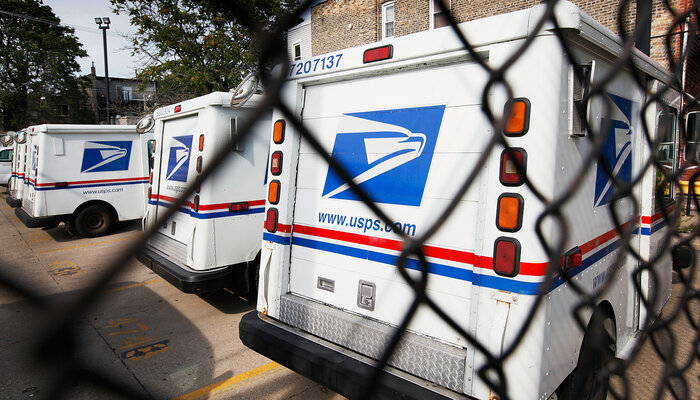We face a looming crisis at the U.S. Postal Service. While it affects us all, a reduction in postal service would prove especially devastating for those behind bars, many of whom depend on mail to contact their loved ones and legal counsel.
President Trump has admitted publicly that his opposition to funding the USPS is intended to prevent mail-in voting during the general election. This past June, he appointed Louis DeJoy as postmaster general. Since assuming his role, DeJoy has made numerous changes, such as removing mail sorting machines and mailboxes, shuffling top personnel, and eliminating overtime for postal workers. The intense backlash may — or may not — have altered these plans.
With increasingly limited means of communication for those behind bars due to the pandemic, mail remains critically important to incarcerated people and their families. In response to Covid-19, many correctional facilities have limited in-person visits. As of August 18, the federal government and 16 states have suspended all forms of visitation in their correctional facilities. Twenty-seven states have suspended all visitation except for legal visits, and nine states allow visitation only with certain precautions in place.
Remote communication — by phone call, email, or video conferencing — allows some incarcerated individuals to reach the outside world, but internet access in prison remains restricted. There are also high costs for these types of communication. For example, as of 2019, the prisons in at least six states charged at least $3 for a 15-minute in-state phone call. In 12 states, at least one jail charges $12 or more for a 15-minute in-state phone call. For many people behind bars with limited financial means, the cost of making a phone call can be nearly impossible to afford. While many jails and prisons are offering free phone calls during Covid-19, these policies are unlikely to last beyond the pandemic.
While some incarcerated individuals may be able to take advantage of remote communication options, the USPS remains a lifeline for millions of Americans behind bars. The right to mail is so fundamental for the incarcerated that it is included in the United Nations’ minimum rules for the treatment of prisoners and the Geneva Convention. Prisons and jails handle millions of pieces of mail each year, with Virginia’s correctional system alone processing over 1.4 million pieces of mail annually. Notably, this latest mail crisis is not a first for those behind bars. Over the years, budget cuts and drug enforcement policies have restricted mail access for incarcerated individuals in many states. Such changes have even prompted protests from incarcerated individuals.
In addition to impinging upon incarcerated individuals’ rights, limiting access to mail would greatly impair communications between incarcerated individuals and their families. Topeka K. Sam, the founder and executive director of the Ladies of Hope Ministry and senior advisor to New Yorkers United for Justice, describes how: “[It] means that mothers, fathers, brothers, sisters who are eager to connect with their families, with the only form of communication they really have, are being silenced. The emotional implications of not hearing from loved ones are significant and unacceptable.” Nearly 5 million children in the United States have an incarcerated parent. In some states, the impact is especially severe, with 20 percent of children in Arkansas, 15 percent in Kentucky, and 13 percent in Arizona having an incarcerated parent.
Mail is also crucial to incarcerated individuals’ ability to communicate confidentially with their legal counsel, a right guaranteed by the Sixth Amendment. Norman Reimer, executive director of the National Association of Criminal Defense Attorneys, explains that “any effort to degrade the USPS is an attack on the constitutional and human rights of incarcerated individuals.” In fact, attorney-client mail is afforded special confidential treatment by correctional officials. Further, all incarcerated individuals are entitled to send legal mail regardless of their ability to pay for postage.
Considering that the USPS processes nearly 500 million pieces of mail every day, any attempt to “kneecap” the service threatens to limit access to disability, Social Security, and veteran benefits; constrict rural America’s connectivity; delay delivery of medication and prescriptions; limit essential deliveries for those with medical vulnerabilities; and slow the payment and receipt of bills and paychecks — all during a nationwide economic downturn and pandemic.
The Trump administration’s changes to the USPS may be on hold temporarily — but serious doubts persist. Regardless, the mail is critical to our election and to vulnerable communities across America — particularly incarcerated populations who are often overlooked and seldom heard. Congress must continue to monitor the administration of the USPS to ensure continued services for everyone, including those behind bars who need access to mail during this unprecedented time.







